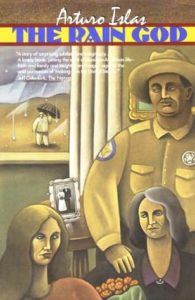
“The Rain God” by Arturo Islas, is a novel about a Mexican family living in the United States of America. Islas writes about different characters in his novel, and first he starts off with Miguel Chico. Miguel Chico is the son of Miguel Grande and Juanita. Miguel Chico is the only family member to have a higher education and decides to go to College in San Francisco. Miguel Chico distances himself from the family, so the family raises suspicion towards him. Miguel Chico is not married, so his family suspects him of being gay. Miguel Chico’s father, Miguel Grande, did not allow him to play with dolls and wanted Miguel Chico to become a man due to Miguel Grande Macho-ness. Miguel Grande was an individual who was very patriarch. He was viewed as “head of the household” and his presence dominated all the family gatherings. although, Islas does not confirm of the character being gay, we can see that Miguel Chico suffers from sexuality in this novel. Some questions I have are, Why do you think the author, Arturo Islas, leaves us wondering if Miguel Chico was gay or not? Was it because many Chicano/s would not accept his book? Does the Chicano/a Family have an influence in this??

I think Arturo leaves the readers not knowing because he wants us to decide. If we are of old mentality, that men and women are not married by a certain age, their gay. Or we are open minded readers, who think that he is married yet because he doesn’t want to, or he hasn’t found the one. In the Latino culture, there is a stigma with men and women who are not married, or have ever had a boyfriend or girlfriend that the only answer is their gay. Which of course has nothing to do with someone’s decision in having a relationship or even sharing it. This has happened a lot in my family, cousins who have not married or showed a “novio” to the family is for sure gay (according to my family). So I would like to believe that Arturo is giving us the choice, to decide if we think he is gay or not. I don’t think he is gay. I think about my family and you can think of yours too, aunts uncle’s, cousin’s etc. family who has not married, would you think their gay for it? Would that hurt your view or admiration for that family member?
I completely agree with the person above he may have never said anything because he wanted the reader to decide for themselves. I believe it depends on the environment one grows up in to determine whether they accept or refuse to agree with this way of living. Some people from the older generation may shun a person out of their life for good if they were to find out if they were gay, other people from the same generation have decided to let that person to choose happiness instead of stress and living a life they don’t agree with. I feel this goes for today’s generation as well. Depending if you are acceptable or not will determine the influence you have when speaking about this topic.
I believe the author, Arturo Islas, leaves us contemplating the sexual orientation of Miguel Chico because it allows the readers to be open to different choices. As we have seen in our text and films that the Chicano community has held men to strict gender standards and if one does not demonstrate those characteristics will be subjected to being viewed as gay or “less than” of a man. As professor Perez discussed in this week’s video lecture that it took Islas a long time to get the publication of the book approved and maybe he had to leave the question of Miguel Chico’s sexual orientation similar to his own, a mystery, to be accepted in a ‘machismo’ society. Chicano/as would not accept this book because it goes against the social norms of gender roles for men and a man who does not work “hard”, the typical physical labor, their contributions could be perceived as ‘less than.’ As previous comments about family labeling family members as gay due to the absent of a partner, but Miguel Chico attended a higher education institution that equipped him with more knowledge and understanding of bringing a child into the home prior to personal goals and admirations. The Chicana/o family does influence on this question because there is a sense of “shame” in the families for those older than 25 years old who are childless and single.